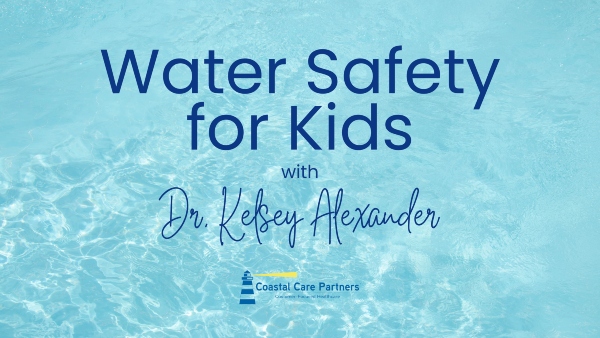Savannah pediatrician Dr. Kelsey Alexander: Water Safety for Kids

Savannah Pediatrician Dr. Kelsey Alexander on the leading cause of death in kids ages 1-4: drowning.
Below is a guest post by Savannah pediatrician Dr. Kelsey Alexander @ Coastal Care Partners’ new Concierge Pediatric Clinic
Water Safety for Kids
School’s out, and with the warm, sunny days ahead, boat rides and trips to the beach or pool are likely in your future! As you plan for your family’s summer fun, it’s important to keep water safety in mind.
As the leading cause of death in children ages 1-4 years old and the second leading cause of death for children ages 5-14, drowning accidents affect nearly 1,000 children per year, mostly between the months of May and August. So this summer, stay prepared with the below water safety tips!
Start Swim Lessons Early
Swimming is a life-saving skill that we need to teach our children and it is never too early to start. Children can start ISR (Infant Swimming Resource) swim lessons as early as six months old to learn how to float on their backs. Standard classes usually start at 18 months and teach small children how to swim to a pool ledge or short distances. Older children should learn different swim strokes to equip them for situations like fighting currents.
We do not recommend using swim floaties to teach children to swim properly. Floaties hold a child upright, encouraging them to bob up and down instead of swimming horizontally. However, families with multiple children or children that have no fear may need to use swim floaties for certain children. If your child wears swim floaties, make sure they do not take them off the entire time you are in the gated area of the pool and continue to keep them within arm’s reach.
Never Swim Alone
When kids are around water, make sure they are never left alone, including during bath time. Adults should know how to swim themselves and should never be less than an arm’s length away from kids who are not strong swimmers. For older children, make sure they always have a swimming partner. If your child is attending a camp with a pool, ensure the area is fenced and that life jackets will be provided for open water activities. While lifeguards on duty are a wonderful resource, do not rely on lifeguards alone to watch your children.
Know the Signs of Drowning & How to React
It is smart for all parents and kids to know what to do in emergency situations. Teach your children that if another child pulls them under water, even if that child cannot swim, they need to
kick that child off of them and yell for help from an adult. Limit distractions while watching your child swim because drowning is silent as opposed to what you see in the movies where kids make noise and flail their arms. Most start with their head bobbing above water, but their mouth and nose are underwater. We recommend that all parents take a CPR course in the event of an emergency, and we offer 30-minute one-on-one instruction in our office for anyone who is interested. Call 912-598-6312 for more information!
Pool Tips
If you have children or grandchildren that are not strong swimmers, it is incredibly important to install a fence around all four sides of your backyard pool. If one side of the fence is open to the house, it is just as dangerous as not having a fence. The fence should be at least four-feet high and non-climbable with a self-closing, self-locking gate. Until you can install a fence, we recommend installing locks at the top of the door and utilizing door alarms so that children cannot access the pool. When hosting families with children that are not strong swimmers, the pool should be fully enclosed, locked, and/or monitored even if children are not ‘supposed’ to be swimming. If hosting a pool party, consider hiring a lifeguard or designating “Water Watchers” to watch the pool for 15-minute increments, and avoid using large floats in the pool to improve visibility.
Open Water Tips
Open water is unpredictable and susceptible to several dangers like currents, rip tides, limited visibility, depth, and uneven surfaces. If your backyard leads to open water, consider fencing off access. Children should have Coast Guard-approved life jackets for all boat rides and recreational activities on the water. Teach children best practices, like only swimming in designated areas, always entering feet first, and avoiding cold water that can cause shock.
As your family embarks on the summer fun ahead, we hope you will keep these tips in mind. To learn more about water safety, please visit safekids.org, healthychildren.org, and usla.org/page/ripcurrents.
_________
Coastal Care Partners, 4B Skidaway Village Walk, Savannah, GA 31411, 912.598.6312. Coastal Care Partners Concierge Pediatric Clinic is a SouthernMamas.com advertiser










































